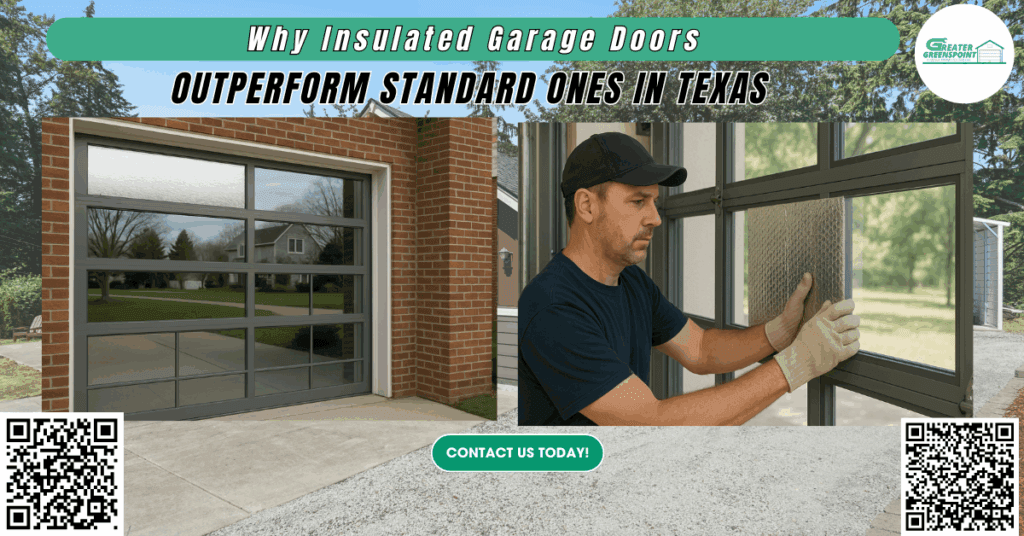On a scorching July afternoon in Houston, we got a call from a customer struggling with a garage that felt hotter than the desert. The space was being used as a home gym and storage area, but the heat was unbearable, even tools stored inside were warping! The culprit? A thin, single-layer steel garage door with no insulation. We upgraded the homeowner to high-efficiency insulated garage doors built with polyurethane foam core panels and steel reinforcement. The result? Cooler garage space, lower energy bills, and a dramatically more comfortable home environment.
It’s not just one case, this is a pattern we see across Greater Houston. Standard, non-insulated garage doors offer little resistance to temperature extremes. With Texas’s blistering summers and sudden cold snaps, many homes and businesses suffer energy loss and rising utility costs due to poor garage insulation. Homeowners often don’t realize how much heat transfer occurs through their garage door until their energy bills spike, or they start to feel discomfort in rooms connected to the garage.
According to the U.S. Department of Energy, garages with poor insulation can account for 10%–20% of a home’s total energy loss. That makes insulated garage doors more than just a comfort feature; they’re an essential investment in energy efficiency, home protection, and financial savings. Let’s explore why insulated garage doors are superior to standard models, especially here in Texas.
What Is an Insulated Garage Door and Why Does It Matter?
An insulated garage door is constructed using multiple layers of material, commonly steel or aluminum, with an insulation core like polyurethane, polystyrene, or batt insulation sandwiched in between. These doors often include a third interior steel backing for increased strength and durability. In contrast, non-insulated doors are typically single-layer panels made from aluminum or steel, offering little to no resistance to outdoor temperatures.
Popular options like Clopay garage doors, Martin garage doors, Amarr garage doors, and Craftsman garage doors offer various insulation types and materials to suit every homeowner’s needs. Whether you opt for polyurethane foam, known for its high R-value, or rigid foam boards that create a thick insulation barrier, these materials greatly reduce thermal transfer, the movement of heat from one side of a surface to another.
Key materials used in insulated garage doors:
- Polyurethane: Offers the highest insulation performance with excellent R-values (up to R-18+)
- Polystyrene: Cost-effective, slightly lower R-value, still highly effective
- Fiberglass and Styrofoam: Often used in garage door insulation kits for DIY upgrades
- Batt insulation: Common in insulation retrofits, but less efficient than foam cores
With a well-insulated door, your garage becomes an effective temperature barrier, reducing energy loss and preventing heat transfer that drives up energy costs.
Fighting the Texas Heat and Humidity
In Texas, summer temperatures regularly exceed 100°F. The garage often acts as a heat trap, especially when it’s built using lightweight aluminum or steel panels with no insulation. This extreme heat transfer not only makes the garage space unbearable, but it also affects adjacent indoor areas and forces your HVAC system to work harder.
Insulated garage doors block much of that outdoor heat, thanks to the urethane foam or polystyrene insulation packed within their layers. They help:
- Reduce interior garage temperatures by 15–25°F on average
- Minimize the strain on home cooling systems, especially in attached garages
- Protect items stored in the garage from warping or damage caused by extreme heat
Insulated doors with higher r-values and lower u values act as a reliable thermal barrier, making your home more energy-efficient during both the summer and winter months.
Saving Money Through Energy Efficiency
When garages are left uninsulated, they become major sources of energy loss, especially when garage doors are opened multiple times a day. Poor insulation leads to constant temperature fluctuation and increased energy bills.
Switching to an insulated garage door is one of the smartest ways to improve a home’s energy efficiency:
- A properly insulated garage door with a high R-value (R-13 to R-18) can lead to energy savings of 10% to 20%
- Climate-controlled garages, especially with insulated walls and doors, create a more consistent environment
- Insulated doors reduce the need for space heaters or fans inside the garage, saving further on electricity costs
The initial cost of an insulated garage door may be higher than a basic single-layer one, but the return on investment is clear through long-term savings and enhanced comfort.
Enhancing Comfort Inside and Outside the Garage
Garages are no longer just for parking your car; they’re often used as home gyms, workshops, laundry areas, and storage units. A comfortable temperature makes all the difference when you’re doing a workout or organizing holiday decorations.
Benefits of improved garage door insulation include:
- Better temperature control in rooms above or beside the garage
- Protection for stored items (e.g., tools, electronics, paints) from heat, humidity, and cold
- A more livable garage space that can be used year-round
Adding an insulated door not only improves internal conditions but also extends the life of items and equipment stored inside. It’s a long-term investment in the usability of your garage space.
Noise Reduction That Makes a Big Difference
Another huge perk of insulated garage doors is noise reduction. Whether you’re leaving early in the morning or your kids are napping above the garage, the added insulation helps quiet both exterior and mechanical sounds.
How insulation helps with noise:
- Damps garage door opener vibrations
- Reduces echo and sound from door movement
- Shield the interior from outside noise like wind, traffic, or barking dogs
For homes with bedrooms or offices near the garage, or in urban settings with lots of street noise, an insulated door can go a long way in improving indoor peace and quiet.
Greater Strength, Security, and Durability
Insulated garage doors are more than just energy-saving; they’re built to last. The extra layers of steel, aluminum, and foam insulation create a door that’s stronger, more resistant to damage, and better at protecting your home.
Insulated doors:
- Resist dents, dings, and damage from bikes, tools, or minor impacts
- Stand up better to Texas weather, from hail to high winds
- Improve home security, thanks to their durable build and firm seal
Whether you’re worried about storm damage or just want to avoid frequent repairs, an insulated garage door is a smart choice for longevity.
Better Curb Appeal and Resale Value
Your garage door is one of the most visible parts of your home exterior. Replacing an outdated, damaged, or plain single door with a stylish, insulated one enhances the look of your entire property.
Today’s garage door products come in a wide range of styles, materials, and colors, including:
- Modern and traditional designs
- Carriage house or raised panel looks
- Window inserts, textures, and trim details
Popular models from Chamberlain, Amarr, and Clopay also allow for smart garage door opener integration, adding both curb appeal and smart features to your home.
An upgraded insulated garage door can significantly boost home value, especially when paired with energy-efficient upgrades throughout the house.
Perfect for Commercial Spaces and Warehouses
Commercial buildings in Houston can benefit just as much, if not more, from the installation of insulated garage doors. They help businesses:
- Protect inventory from heat and cold
- Create more comfortable working conditions for staff
- Cut down on climate control costs
- Reduce operational noise from frequent door cycles
Whether you’re running an auto repair shop or a distribution warehouse, investing in insulated commercial sectional doors pays off in performance and savings.
How Can Greater Greenspoint Garage Door Center Co. Help You?
At Greater Greenspoint Garage Door Center Co., we specialize in helping Houston-area residents and businesses upgrade to energy-efficient, insulated garage doors. We offer a full step-by-step guide from helping you choose the right door types, materials, and R-values, to installation, maintenance, and repair.
✅ We install premium brands like Clopay, Martin, Amarr, and Chamberlain garage doors
✅ We provide garage door insulation kits, upgrades, and smart opener integrations
✅ Our team is trained in everything from garage door opener logic boards to weather sealing
✅ We ensure every installation meets the highest standards of durability, efficiency, and style
✅ We handle both residential and commercial projects across Greater Houston
📍 Visit us: North Fwy, Houston, TX 77037
📞 Call now: (281) 868-6330
Don’t wait for another Texas summer to remind you of your garage’s weak spots. Let Greater Greenspoint Garage Door Center Co. transform your garage with high-quality, energy-efficient insulated garage doors that save you money and keep your home or business comfortable. Call today or schedule your consultation!
Frequently Asked Questions (FAQs)
1. Can I insulate my existing garage door, or do I need to buy a new one?
Yes, you can add insulation using a garage door insulation kit, but for maximum energy efficiency and durability, a professionally installed insulated garage door is recommended.
2. How long does an insulated garage door typically last?
With proper maintenance, insulated garage doors can last 15 to 30 years, depending on the materials and usage.
3. Will an insulated garage door help in the winter as well as in the summer?
Absolutely, insulated garage doors help retain heat during the winter and block heat during the summer, making them beneficial year-round.
4. Do insulated garage doors require more maintenance than standard doors?
No, insulated garage doors require about the same level of maintenance as standard ones but may experience less wear due to their reinforced construction.

